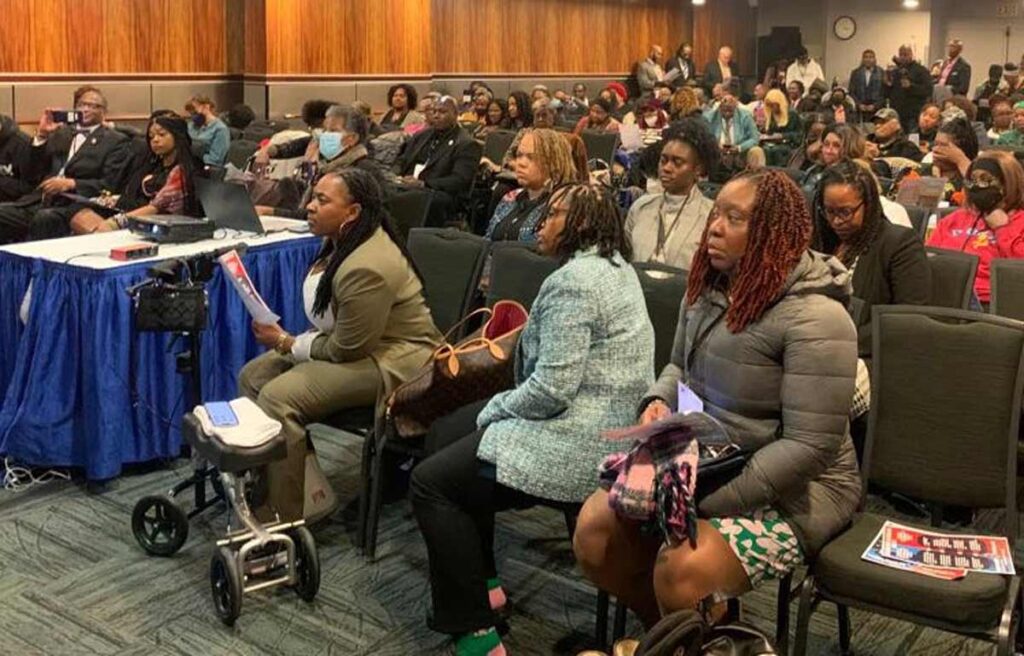By Mary Alice Miller
Reparations for the harms inflicted upon enslaved persons under the United States chattel slavery system and their descendants is an idea whose time has come. HR-40, a bill establishing a Commission to Study and Develop Reparation Proposals for African Americans, was first introduced by Representative John Conyers in 1989 and for the next 30 years until his retirement. More recently, cities across the country have implemented their forms of reparations. And in 2020, California established a first-in-the-nation state-level Reparations Taskforce.
New York State has passed a reparations bill in the assembly but has yet to be in the Senate. This legislative session, Democratic Socialist Jabari Brisport has garnered some support for the bill and has assembly support from Michaelle Solages, Deputy Majority Leader and Chair of the Black, Puerto Rican, Hispanic, and Asian Legislative Caucus.
Assemblywoman Nikki Lucas sees that bill as deeply flawed. “Racial healing in the United States cannot happen without repair,” said Lucas. “My bill calls for specific redress to the Descendants of Persons Enslaved in the United States, and it calls for the development of a Freedman’s Bureau whose initial task will be to identify the Descendants of American chattel slavery. This bill has the best chance of passing as legislation because it is constitutionally sound.”
Both versions of the bill look similar until you delve into the details.
The Brisport/Solages version has 11 proposed task force members, including two members each from N’COBRA (National Coalition of Blacks for Reparations in America), December 12th Movement, and Institute of the Black World, in addition to including one each appointed by the governor, speaker of the assembly, temporary president of the senate, minority leader of the assembly and minority leader of the senate who would have no input into the pre-determined composition of the task force. No matter how well-intentioned, the naming and allocating of tasks to specific non-profit organizations in a bill fails to pass the smell test and could cause unintended consequences.
Lucas’ bill builds upon the California Reparations Taskforce, which has nine members: 5 appointed by the governor, two appointed by the President pro-Tempore of the Senate, and two appointed by the Speaker of the Assembly. Lucas’ bill calls for 11 members: 5 appointed by the governor, three members each appointed by the president pro tempore of the senate, and the speaker of the assembly. In addition, Lucas’ bill would require that task force members support American freedmen lineage-based reparations.
Lucas warns that a race-based bill would be found unconstitutional.
Last year, California’s task force on reparations voted to limit state compensation to Black people in the United States in the 19th century, whether free or enslaved, rejecting a race-based proposal to include all Black people. The majority vote argued against including Black immigrants who voluntarily came to the United States in the 20th and 21st centuries, thereby not sharing the trauma of centuries of kidnapping and forced servitude while benefiting from the modicum of freedom and safety that U.S. chattel enslaved people and their descendants fought and died for.
The Brisport/Solages bills seem to conflate modern-day persecution with chattel slavery, with language to specifically “examine the lingering negative effects of the institution of slavery on living African Americans and on society in the United States.”
Lucas’ bill would establish a New York State Freedmen’s Bureau, established and funded as its state agency with its budget, responsible for all genealogy work connecting American freedmen with their lineage.
Friday Jones, president of the National Assembly of American Slavery Descendants (NAASD.org), argues for lineage-based reparations. “We are descendants of chattel slavery,” said Jones. “From the 1800s to 1933, the Ex-Slave Pension Movement, the largest movement of formerly enslaved persons, presented 400,000 signatures to the federal government to get pensions for formerly enslaved persons. The social security Act of 1935 excluded domestic and farm workers from benefiting from social security. Most domestic and farm workers were descendants of chattel enslaved people.”
Jones firmly believes eligibility for reparations should be based on the political and cultural status of descendants of chattel enslaved people, not race or class.
Devine Prince, president of the U.S. Freedman Project (usfreedmanproject.org), concurs with Jones. “The community of eligibility for reparations for harms of chattel slavery was always descendants of the formerly enslaved,” said Prince, “until N’COBRA and NAARC (National African-American Reparations Commission) came in and redefined who was eligible.”
Prince pointed out the absurdity of blurring the lines of who would be eligible for chattel slavery reparations. “White people could apply for and get reparations for harms of chattel slavery,” he said. In Providence, Rhode Island, a reparations program includes Black residents, Native-American residents, White residents earning under $50k, and those who live in low-income neighborhoods. The source of funding for the program is COVID-19 federal recovery dollars which must be race-neutral.
Jones disagrees with state-by-state reparations bills “because states’ rights have been punitive,” she said.
Prince added, “We believe the culpable and only party large enough to pay reparations for chattel slavery based on international law is the U.S. federal government.” Prince was referring to the United Nations’ 5 pillars of reparations: Cessation/Assurance of Non-Repetition, Restitution, Compensation, Satisfaction, and Rehabilitation.
“If we are serious about reparations, then we must get this bill through the legislature and to the Governor’s desk,” said Lucas. “This is not about who makes the most noise; it’s about having a real reparations bill that will pass the legislative process. Through legislation, slavery became legal, and it is only through legislation that we will see reparations become a reality.”
Lucas’ American Freedman Bill Draft Bill 07407-01-3 needs an index number to move through committees. She recommends that anyone who wishes to see her bill get an index number should contact Assembly Speaker Carl Heastie and/or their Assembly representative.
